Trading in Securities: A Practical Guide to Account Opening, DEMAT, Order Placement, Contract Notes, and Settlement
1. Opening an Account to Trade in Securities
To participate in the stock market (e.g., NSE, BSE), investors need to establish several accounts:
A. Demat Account:
- Definition: A Dematerialized (Demat) account is an electronic repository that holds shares and securities in a digital format. It eliminates the need for physical share certificates.
- Requirement: A Demat account is mandatory for trading in equities (stocks), mutual funds, bonds, and Exchange Traded Funds (ETFs) in India.
-
Depositories: Demat accounts are registered with and maintained by two central depositories in India:
- NSDL (National Securities Depository Limited)
- CDSL (Central Depository Services Limited)
- Purpose: To facilitate the secure and efficient holding and transfer of securities.
B. Trading Account:
- Definition: A Trading Account is used to place buy and sell orders for securities on the stock exchange.
- Function: It acts as a gateway to the stock market, allowing investors to access the trading platform and execute transactions.
- Linkage: The Trading Account must be linked to both the Demat Account (for holding the shares) and a Bank Account (for fund transfers).
C. Bank Account:
- Purpose: A Bank Account is essential for transferring funds between the investor and the broker.
- Essential for Trading: It is used to deposit funds for buying securities and to receive funds from selling securities.
- Account Linkage: The Bank Account must be linked to both the Trading Account and the Demat Account to enable seamless transactions.
Process of Account Opening:
-
Choose a Broker:
- Select a SEBI-registered stockbroker (e.g., Zerodha, Angel One, ICICI Direct) based on your investment needs and preferences.
- Consider factors such as brokerage fees, trading platform features, research and advisory services, and customer support.
-
Submit Application:
- Fill out the Know Your Customer (KYC) form online or offline, providing personal and financial information.
-
Provide Documents:
- Submit required documents, including:
- PAN card (mandatory for all financial transactions in India)
- Aadhaar card (for identity and address verification)
- Bank account details (cancelled cheque or bank statement)
- Income proof (required for trading in derivatives)
- Submit required documents, including:
-
In-Person Verification (IPV):
- The broker will verify your identity through a video call or an in-person visit.
- This step is required to comply with KYC regulations.
- Receive Login Credentials:
2. DEMAT System
A. Meaning & Importance:
- Definition: The DEMAT system is a system for holding securities in electronic form instead of physical certificates.
- Key Advantage: It has revolutionized the way securities are held and transferred, making transactions faster, safer, and more efficient.
B. Features of the DEMAT System:
- Eliminates Paper-Based Risks: Eliminates the risks associated with physical share certificates, such as loss, theft, forgery, and damage.
- Speeds up Settlement: Enables faster settlement of trades, with securities transferred electronically in the T+1 cycle.
- Reduces Transaction Costs: Eliminates stamp duty on the transfer of electronic shares, reducing overall transaction costs.
- Easy Transfer & Pledging: Simplifies the process of transferring securities and using them as collateral for loans.
C. Participants in the DEMAT System:
-
Depositories (NSDL & CDSL):
- Organizations licensed by SEBI to hold securities in electronic form on behalf of investors.
- Maintain the central record of ownership of dematerialized securities.
-
Depository Participants (DPs):
- Intermediaries between the depositories and investors, providing Demat account services.
- Can be brokers, banks, or other financial institutions (e.g., Zerodha, HDFC Securities).
- Facilitate the opening and maintenance of Demat accounts and the transfer of securities.
-
Stock Exchanges (BSE, NSE):
- Provide the trading platform for buying and selling securities.
- Transactions are executed electronically and reflected in the investors' Demat accounts.
3. Placing an Order for Purchase/Sale of Shares
A. Steps to Place an Order:
-
Login to Trading Platform:
- Access the broker's trading platform using your login credentials.
-
Select Stock & Quantity:
- Choose the security you want to trade (e.g., stock, bond, ETF) and specify the number of shares or units you wish to buy or sell.
-
Choose Order Type:
- Select the type of order you want to place:
- Market Order: Buy or sell at the best available price in the current market.
- Limit Order: Buy or sell at a specified price or better.
- Stop-Loss Order: Automatically exits a trade if the price reaches a pre-set level, limiting potential losses.
- Select the type of order you want to place:
-
Confirm the Order:
- Review the order details carefully and confirm the trade through the broker's platform.
-
Order Execution:
- The stock exchange matches the buy and sell orders based on price and time priority.
- Once a matching order is found, the trade is executed.
4. Contract Note
A. Meaning & Importance:
- Definition: A Contract Note is a legal document issued by the broker to the investor after a trade has been executed.
- Proof of Transaction: It serves as proof of the transaction and contains all the essential details of the trade.
B. Details in a Contract Note:
- Order Details: Stock name, quantity, price, and buy/sell indicator.
- Trade Execution Time: The exact date and time at which the trade was executed.
- Brokerage & Charges: A breakdown of all charges, including brokerage fees, Securities Transaction Tax (STT), Goods and Services Tax (GST), SEBI charges, and other applicable levies.
- Settlement Details: Information about the settlement obligations, including the amount of money to be paid or received and the shares to be delivered or received.
-
SEBI Registration Number: The broker's unique registration number with SEBI, indicating their authorization to operate in the Indian stock market.
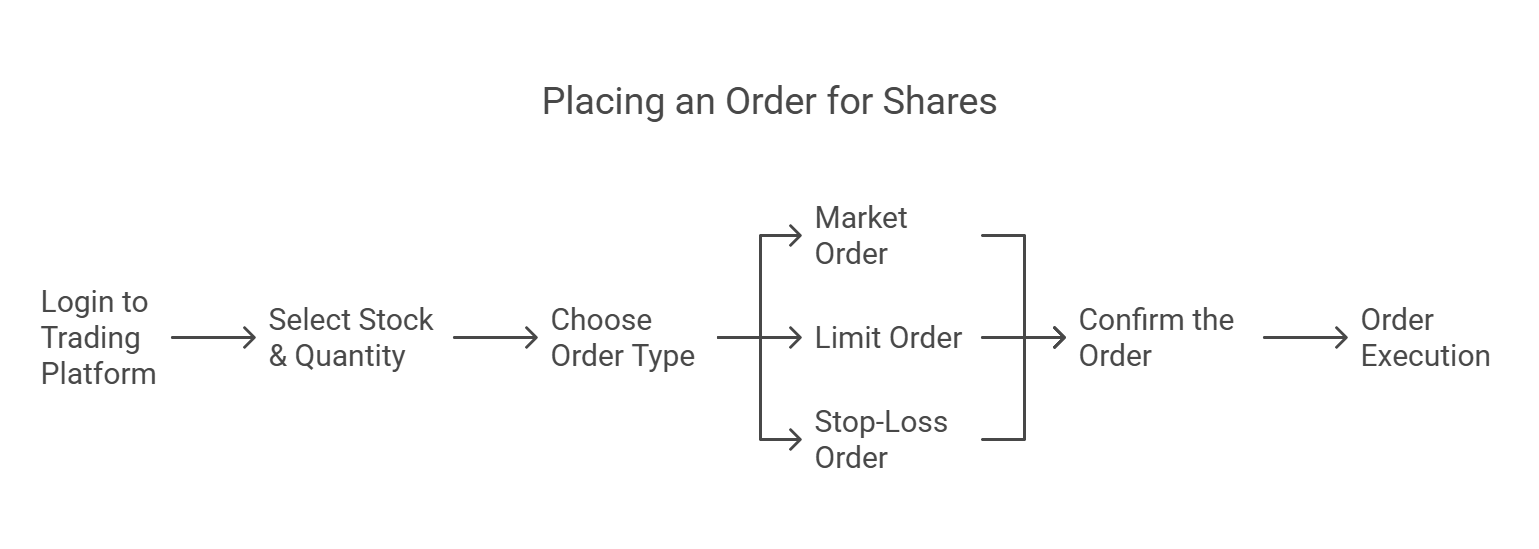
5. Settlement of Contracts
A. Meaning:
- Definition: Settlement is the process of transferring ownership of the securities from the seller to the buyer and transferring funds from the buyer to the seller.
B. Types of Settlement:
-
Rolling Settlement (T+1):
- The standard settlement cycle for most securities in India is T+1, meaning that the settlement process is completed within one business day from the date of the trade.
- Example: If stocks are bought on Monday, they will be delivered to the buyer's Demat account on Tuesday.
- Securities are transferred electronically through the Demat system, ensuring a seamless and efficient transfer of ownership.
-
Auction Settlement:
- Occurs when a seller fails to deliver the shares on time due to unforeseen circumstances.
- The exchange arranges an auction to buy the shares from the market to fulfill the delivery obligation to the buyer.
- The defaulting seller is liable for any price difference between the original trade price and the auction price, as well as any penalties imposed by the exchange.
-
On-Market vs. Off-Market Settlement:
- On-Market Settlement: Regular trading through the stock exchange's clearing mechanism, ensuring standardized and efficient settlement.
- Off-Market Settlement: A direct transfer of securities between investors, typically used for gifting, inheritance, or other non-trading transactions.
- Off-market transfers must be reported to the depository and are subject to certain regulations.
Conclusion:
Trading in securities involves a series of interconnected steps, from opening Demat and trading accounts to placing orders, receiving contract notes, and settling trades. The DEMAT system ensures secure and efficient transactions, while the T+1 settlement cycle promotes faster delivery and reduces settlement risk. Understanding each step is essential for investors to participate effectively in the stock market and manage their investments successfully.

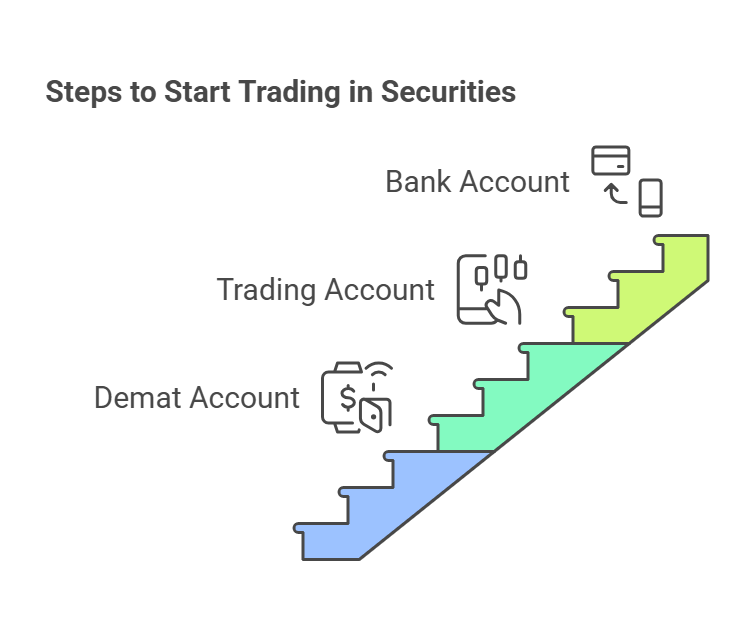
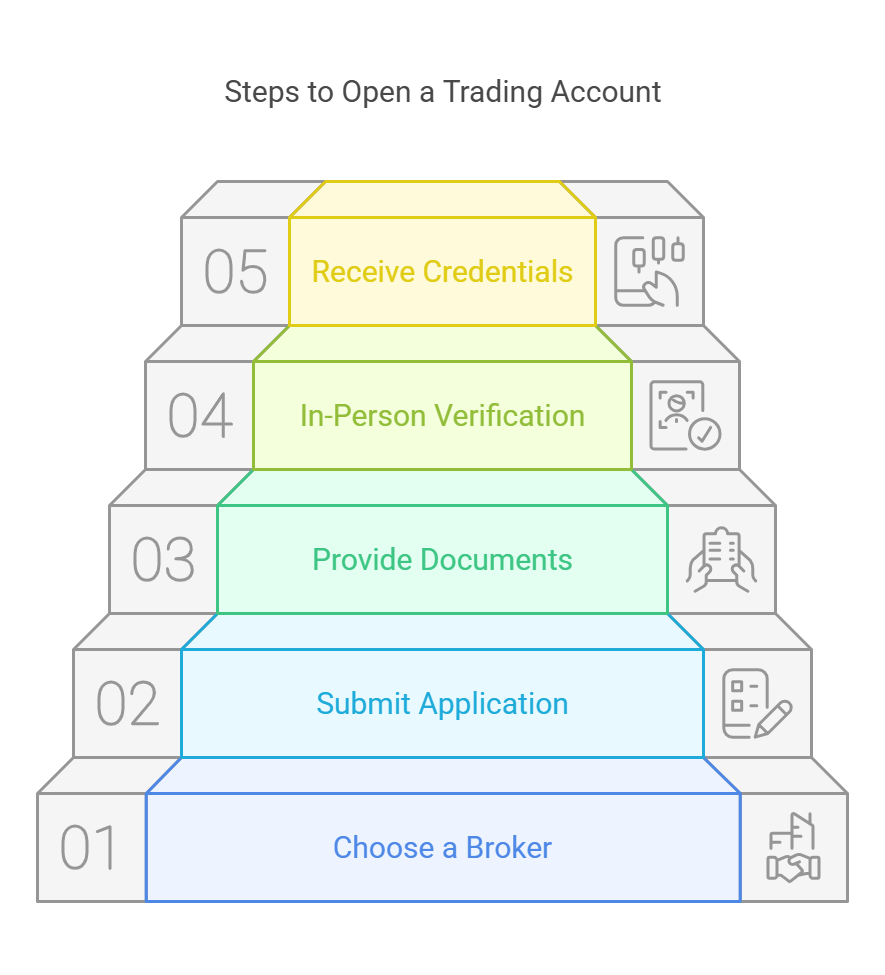
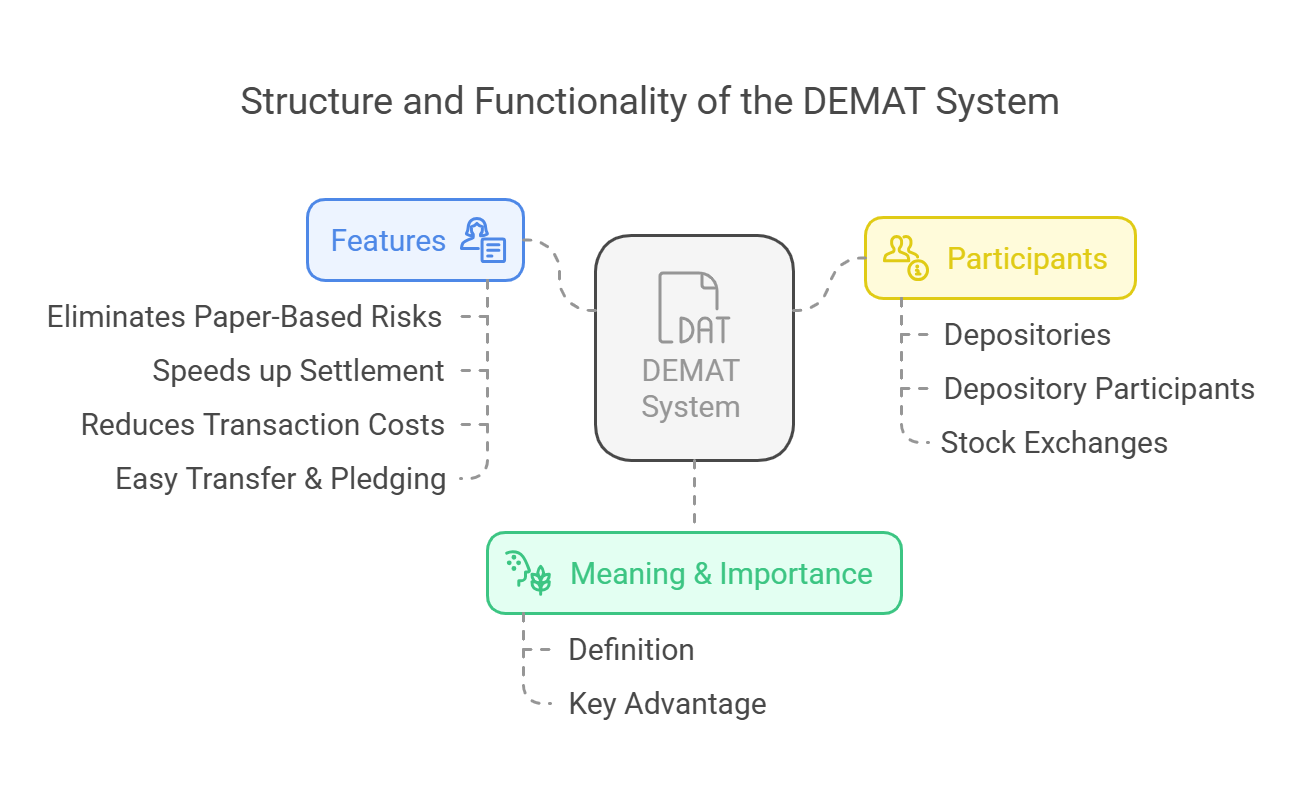
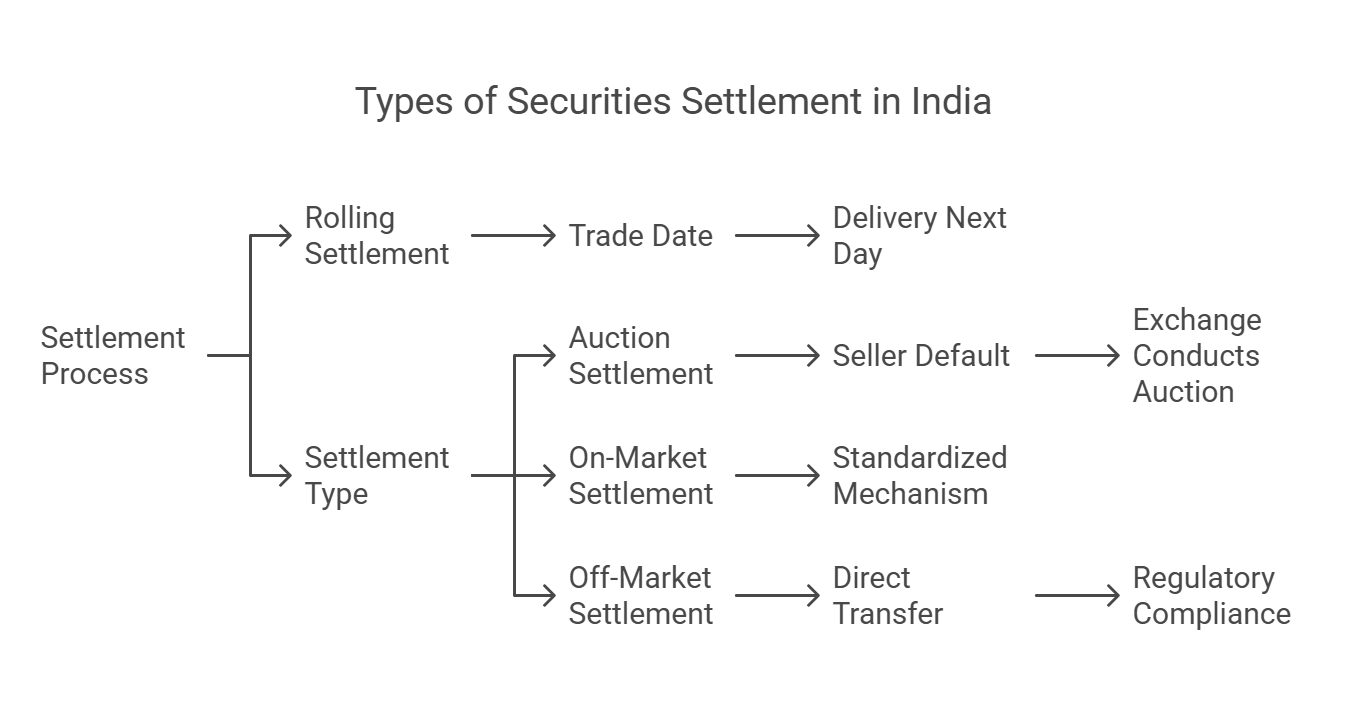
No Comments